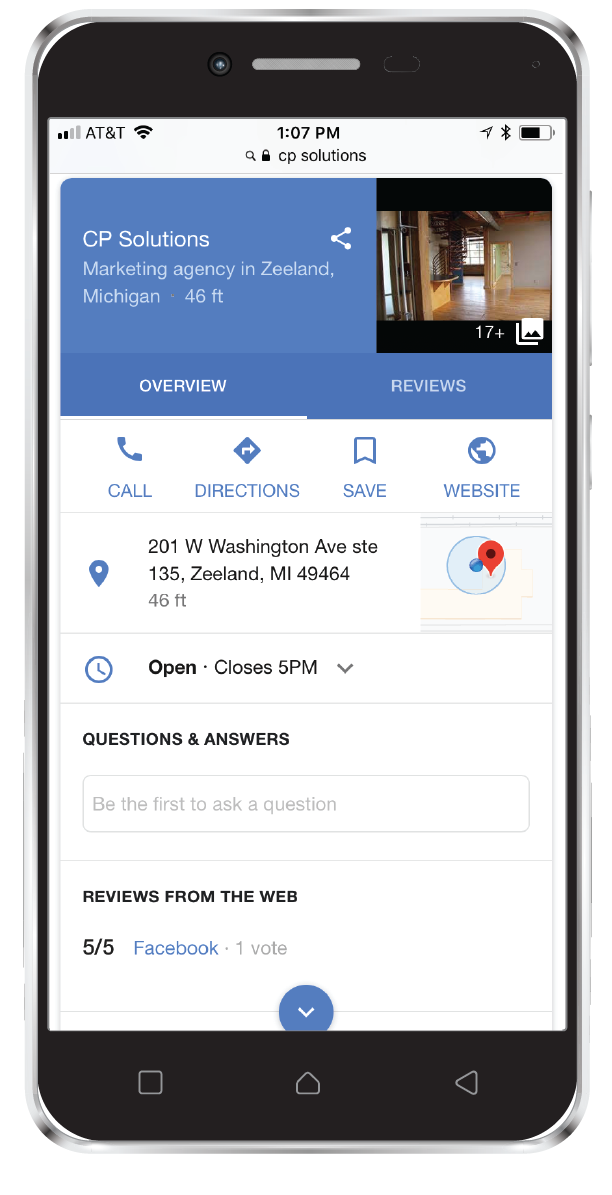Local SEO Services

Picture this:
It’s late at night. You’ve been binge-watching Netflix for, what, six hours? Seven?
Now you suddenly realize you’re hungry. Like, really hungry. Hangry. If you don’t get something to eat pronto, who knows what you might be capable of?
So you do what anyone would in this situation—you whip out your phone and google “Chinese food.”
Right away, you can easily see Google’s top three picks in your area, including their location, how far away that happens to be from you, when they close, and how well they’re regarded by your fellow netizens.
Nice and easy, right?
That is a prime example of what we call local search. You didn’t search for the specific name of a restaurant, and yet Google gave you the options and information you needed to make your choice.
Local Search and Getting YOUR Business Found Online
Let’s switch perspectives for a second:
Imagine being the owner of a Chinese restaurant—although, the basic premise applies to any kind of business—and your establishment isn’t in that coveted initial search that pops up right away (aka “the Google three-pack”).
What does this mean for you as a business owner?
Obviously, you’re missing out on a highly-motivated market. You know definitively that people are searching exactly for the very service you provide.
But your restaurant ranks fourth in the search results—so your potential customers are going somewhere else instead.
Ouch.
When you think about this, it’s like the agony of an Olympic swimmer who finishes in fourth place by a fraction of a second—just off the podium, no medal or glory.
In this case, however, failing to land on that metaphorical podium can lead to massive losses for your company’s bottom line.
Double ouch!

Local Search and Getting YOUR Business Found Online
Let’s switch perspectives for a second:
Imagine being the owner of a Chinese restaurant—although, the basic premise applies to any kind of business—and your establishment isn’t in that coveted initial search that pops up right away (aka “the Google three-pack”).
What does this mean for you as a business owner?
Obviously, you’re missing out on a highly-motivated market. You know definitively that people are searching exactly for the very service you provide.
But your restaurant ranks fourth in the search results—so your potential customers are going somewhere else instead.
Ouch.
When you think about this, it’s like the agony of an Olympic swimmer who finishes in fourth place by a fraction of a second—just off the podium, no medal or glory.
In this case, however, failing to land on that metaphorical podium can lead to massive losses for your company’s bottom line.
Double ouch!

The Good News About Local SEO
Fortunately, we have some good news for you:
Google doesn’t just pick businesses to feature at random.
There is a method to their madness—or “factors in their algorithm” if you prefer—and this is how you turn the tide in your favor.
See, some of those factors for prioritizing and ranking local businesses for specific keywords are at least partially controllable, such as:
- Verifying your Google business listing
- Optimizing description fields with important keywords
- Adding photos
- Generating positive reviews
- Citations across the web (essentially, any place where your business is listed with name, address, and phone number)
Taking measures like these helps Google to respect your business—and this means improved performance in their rankings and, ultimately, claiming your place in the three-packs for the most valuable keywords.
Probably sounds pretty good, right?
Well, here’s the deal:
We’ve helped other businesses do exactly that—and we can do the same for you. We actually can do this easily for you.
The Good News About Local SEO
Fortunately, we have some good news for you:
Google doesn’t just pick businesses to feature at random.
There is a method to their madness—or “factors in their algorithm” if you prefer—and this is how you turn the tide in your favor.
See, some of those factors for prioritizing and ranking local businesses for specific keywords are at least partially controllable, such as:
- Verifying your Google business listing
- Optimizing description fields with important keywords
- Adding photos
- Generating positive reviews
- Citations across the web (essentially, any place where your business is listed with name, address, and phone number)
Taking measures like these helps Google to respect your business—and this means improved performance in their rankings and, ultimately, claiming your place in the three-packs for the most valuable keywords.
Probably sounds pretty good, right?
Well, here’s the deal:
We’ve helped other businesses do exactly that—and we can do the same for you. We actually can do this easily for you.
Aggregators: Playing (and Winning)
the Long Game
Data aggregators—like Acxiom (notable partners to Facebook, eBay and Microsoft, just to name a few) and Infogroup—are organizations whose databases contain information on business listings in the US and around the world. These aggregators share data with thousands of other directories, which makes them the major suppliers of business listing information for the leading search engines.
So what does that even mean?
Ever see Raiders of the Lost Ark? Remember that scene at the end (*spoiler alert*) where some “top men” are wheeling the Ark of the Covenant into a warehouse the size of an aircraft carrier?
Imagine that warehouse being filled with a MASSIVE database of business records for pretty much every company in the country—online listings, utility records, phone directories.
That’s an aggregator.
Aggregators are the key to keeping your business at the top of the listings. But an aggregator can quickly become an aggravator (groan) if it has incorrect, incomplete, or conflicting information about your business.


Since a lot of online citation records are pulling data directly from the aggregators (including Google), a lot of things can go screwy:
- Variations in name, address, or phone number information can cause the wrong info to be sent out to online listings.
- An aggregator could mistakenly assume that there are two separate businesses and make two separate listings.
- Sometimes—even if you’ve already verified and updated your Google listing—bad aggregator data can create so many errors across the online space that Google just assumes whatever you put in is wrong and changes it.
(We have a word for that last one. It’s “ARRRRGGGGHHHHHHHHH!!!!”)
On the flipside, when aggregators are distributing correct and optimized information, it creates what we call a “trickle-down effect of awesome.” Info gets updated and corrected on one listing, and then another, and then another, and then another—across 300+ sites by the end.
This turns your jumbled mess of ugly citations into one gigantic, coordinated super-magnet of SEO juice.
Aggregators: Playing (and Winning) the Long Game
Data aggregators—like Acxiom (notable partners to Facebook, eBay and Microsoft, just to name a few) and Infogroup—are organizations whose databases contain information on business listings in the US and around the world. These aggregators share data with thousands of other directories, which makes them the major suppliers of business listing information for the leading search engines.
So what does that even mean?
Ever see Raiders of the Lost Ark? Remember that scene at the end (*spoiler alert*) where some “top men” are wheeling the Ark of the Covenant into a warehouse the size of an aircraft carrier?
Imagine that warehouse being filled with a MASSIVE database of business records for pretty much every company in the country—online listings, utility records, phone directories.
That’s an aggregator.
Aggregators are the key to keeping your business at the top of the listings. But an aggregator can quickly become an aggravator (groan) if it has incorrect, incomplete, or conflicting information about your business.


Since a lot of online citation records are pulling data directly from the aggregators (including Google), a lot of things can go screwy:
- Variations in name, address, or phone number information can cause the wrong info to be sent out to online listings.
- An aggregator could mistakenly assume that there are two separate businesses and make two separate listings.
- Sometimes—even if you’ve already verified and updated your Google listing—bad aggregator data can create so many errors across the online space that Google just assumes whatever you put in is wrong and changes it.
(We have a word for that last one. It’s “ARRRRGGGGHHHHHHHHH!!!!”)
On the flipside, when aggregators are distributing correct and optimized information, it creates what we call a “trickle-down effect of awesome.” Info gets updated and corrected on one listing, and then another, and then another, and then another—across 300+ sites by the end.
This turns your jumbled mess of ugly citations into one gigantic, coordinated super-magnet of SEO juice.

Managing Your Online Reviews
Search engines like Google and Bing care about more than just their own listings. They’re pulling data from everywhere:
And that includes other third-party, general-purpose business listing sites like Yelp, YellowPages, TripAdvisor, and even Facebook (and other social media platforms).
It also includes more industry-specific listing and review sites. If you’re running a restaurant, for example, you need to be on Zomato. If you’re a lawyer, Avvo. A doctor? Healthgrades. And so on.
The more you’re on these sites, the more places your potential customers can find you. Plus, Google will think you’re hot stuff. (And we all know how important that is, right?)
But we’re not done yet.
Your online reviews are also considered in determining how high you rank in online search results pages—not to mention whether or not searchers think you’re rank (or swank!).
Sadly, the truth of the matter is that most businesses don’t really do anything to encourage reviews, track them, or engage with them in any kind of coordinated way.
At least, that’s sad for those businesses. You, on the other hand, can capitalize on their shortcomings.
Alright, so what do you need to know?
Consider this:
Anywhere from 0-3 reviews—with the most recent one being years old at this point—is pretty standard across most industries. And, by the way, who really has time to keep track of Google, Yelp, YellowPages, Yahoo, TripAdvisor…yeah, you get the idea.
So what you should think about is getting yourself organized with a reputation management system that keeps track of all these listing sites and helps you manage and track your reviews.
You will find that to be a huge advantage—both for your search rank AND your reputation!
And if you want to encourage a greater volume of positive reviews on major sites (and of course, clearly you do), you’re going to get the most success by tying it in with other aspects of your digital marketing efforts, like your website and your database and e-mail marketing.

Managing Your Online Reviews
Search engines like Google and Bing care about more than just their own listings. They’re pulling data from everywhere:
And that includes other third-party, general-purpose business listing sites like Yelp, YellowPages, TripAdvisor, and even Facebook (and other social media platforms).
It also includes more industry-specific listing and review sites. If you’re running a restaurant, for example, you need to be on Zomato. If you’re a lawyer, Avvo. A doctor? Healthgrades. And so on.
The more you’re on these sites, the more places your potential customers can find you. Plus, Google will think you’re hot stuff. (And we all know how important that is, right?)
But we’re not done yet.
Your online reviews are also considered in determining how high you rank in online search results pages—not to mention whether or not searchers think you’re rank (or swank!).
Sadly, the truth of the matter is that most businesses don’t really do anything to encourage reviews, track them, or engage with them in any kind of coordinated way.
At least, that’s sad for those businesses. You, on the other hand, can capitalize on their shortcomings.
Alright, so what do you need to know?
Consider this:
Anywhere from 0-3 reviews—with the most recent one being years old at this point—is pretty standard across most industries. And, by the way, who really has time to keep track of Google, Yelp, YellowPages, Yahoo, TripAdvisor…yeah, you get the idea.
So what you should think about is getting yourself organized with a reputation management system that keeps track of all these listing sites and helps you manage and track your reviews.
You will find that to be a huge advantage—both for your search rank AND your reputation!
And if you want to encourage a greater volume of positive reviews on major sites (and of course, clearly you do), you’re going to get the most success by tying it in with other aspects of your digital marketing efforts, like your website and your database and e-mail marketing.
Be King of the Mountain in Your Market
A quick recap:
Succeeding in local search is a fundamentally simple goal, but with a very complex set of factors you need to consider in order to achieve it.
Actually, forget “complex.” It’s downright labyrinthine at times!
But it’s not impossible, and with the right knowledge and a powerful set of tools—or an experienced marketing agency in your corner—it can certainly be managed.
Local search is one of our professional specialties, so if you need a hand, please feel free to drop us a line online or give us a call anytime. We’ll be happy to chat with you and develop a strategy with the ultimate goal of getting you into the right Google three-packs for your business.
Be King of the Mountain in Your Market
A quick recap:
Succeeding in local search is a fundamentally simple goal, but with a very complex set of factors you need to consider in order to achieve it.
Actually, forget “complex.” It’s downright labyrinthine at times!
But it’s not impossible, and with the right knowledge and a powerful set of tools—or an experienced marketing agency in your corner—it can certainly be managed.
Local search is one of our professional specialties, so if you need a hand, please feel free to drop us a line online or give us a call anytime. We’ll be happy to chat with you and develop a strategy with the ultimate goal of getting you into the right Google three-packs for your business.
© CP Solutions, LLC. All Rights Reserved.
Privacy Policy | Terms of Use
VMD Services, LLC. and 2nGage, LLC. are subsidiaries of CP Solutions
